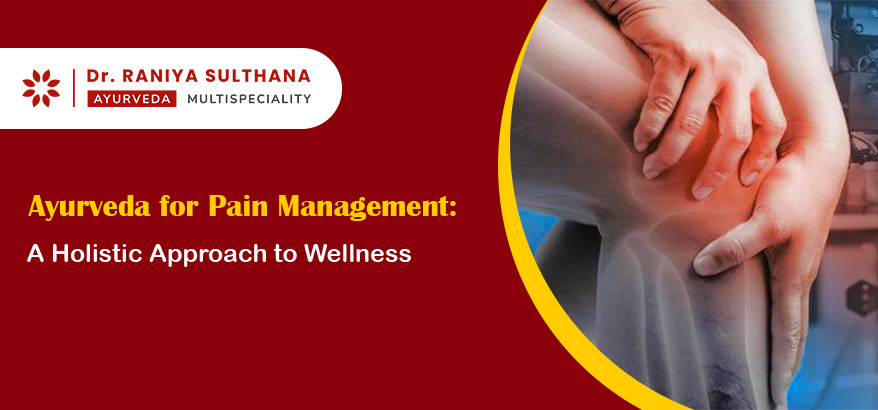
Pain, in its various forms, is a universal human experience. From headaches to chronic back pain, it can disrupt our lives and hinder our overall well-being. While conventional medicine offers effective solutions for pain management, Ayurveda, the ancient system of natural healing originating in India, provides an alternative approach. Ayurveda, which means "the science of life," views pain as an imbalance in the body and seeks to address the root causes. In this article, we'll explore how Ayurveda offers a holistic and natural way to manage and alleviate pain.
Ayurveda categorizes pain based on the doshas – Vata, Pitta, and Kapha. Each dosha has a unique set of characteristics and is associated with different types of pain.
Vata Pain:
Characteristics: Vata pain is often described as throbbing, pulsating, and erratic.
Examples: Arthritis, joint pain, and headaches are typical Vata-related pain.
Pitta Pain:
Characteristics: Pitta pain tends to be sharp, burning, and intense.
Examples: Gastric ulcers, acid reflux, and inflammation are often associated with Pitta pain.
Kapha Pain:
Characteristics: Kapha pain is dull, heavy, and aching.
Examples: Conditions like fibromyalgia and sinus congestion are related to Kapha pain.
Ayurveda focuses on balancing the doshas to alleviate pain effectively. This can be achieved through various methods:
Diet and Nutrition:
Identifying your predominant dosha and adjusting your diet accordingly can help reduce pain. For Vata pain, warm and nourishing foods are recommended, while Pitta pain may benefit from cooling and soothing foods. Kapha pain responds well to a diet that's light and warm.
Herbal Remedies:
Ayurveda offers a wide range of herbal remedies. For example, Turmeric and Boswellia are well-known for their anti-inflammatory properties and can be beneficial for pain management.
Panchakarma:
Panchakarma is a detoxification therapy that can help remove toxins and restore balance in the body. It's particularly effective for Vata-related pain.
Yoga and Exercise:
Ayurvedic yoga and exercise routines are tailored to each dosha. They not only help alleviate pain but also improve flexibility and overall health.
Meditation and Mindfulness:
Reducing stress and anxiety is a crucial part of Ayurvedic pain management. Meditation and mindfulness practices are recommended for mental well-being.
Ayurveda doesn't stop at addressing the physical aspects of pain. It recognizes the interconnectedness of the body, mind, and spirit. Here are some holistic approaches to pain management in Ayurveda:
Aromatherapy:
Aromatherapy, using essential oils, can complement Ayurvedic treatments. Oils like lavender and eucalyptus can provide relief from pain and promote relaxation.
Abhyangam (Ayurvedic Massage):
Ayurvedic massages can alleviate pain by improving circulation, reducing muscle tension, and promoting relaxation. They are often used in combination with medicated oils.
Sound Therapy:
Sound therapy, including chanting and the use of specific sounds, is believed to balance the body's energy and promote healing.
Acupuncture and Marma Therapy:
Acupuncture and Marma therapy stimulate specific points on the body to release energy blockages and relieve pain.
Ayurveda offers a holistic and natural approach to pain management. By understanding the doshas and their characteristics, one can tailor their diet, lifestyle, and therapies to address the root causes of pain. Ayurveda doesn't just treat the symptoms; it aims to bring balance to the body, mind, and spirit, promoting overall well-being.
While Ayurveda can be a complementary approach to pain management, it's essential to consult with an experienced Ayurvedic practitioner to create a personalized treatment plan that addresses your unique needs. Embracing the principles of Ayurveda can be a path to long-term pain relief and a more balanced and harmonious life.
First Floor, Somanathapuram, Door No 4, 11B, Paper Mills Road, near Square Brothers Xerox, Kolathur, Tamil Nadu 600099.
First Floor, 241, Poonamallee High Rd, Maduravoyal, Chennai, Tamil Nadu 600095.
No. 63, HIG1, Ground Floor, Mogappair West Main Road, Nolambur, Chennai, Tamil Nadu 600037.

Copyrights All Rights Reserved Dr. Raniya Sulthana Ayurveda Multispeciality Clinic | Website Designed & Developed By GlintCreatives.com